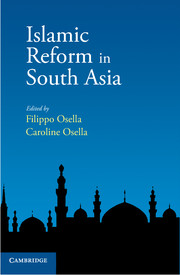Book contents
- Frontmatter
- Contents
- List of Contributors
- Introduction
- Part I Reformist Journeys
- Part II Debating Reform
- 5 The Enemy Within: Madrasa and Muslim Identity in North India
- 6 Islamism and Social Reform in Kerala, South India
- 7 Piety as Politics Amongst Muslim Women in Contemporary Sri Lanka
- 8 The Changing Perspectives of Three Muslim Men on the Question of Saint Worship over a 10-Year Period in Gujarat, Western India
- 9 Women, Politics and Islamism in Northern Pakistan
- 10 Violence, Reconstruction and Islamic Reform: Stories from the Muslim ‘Ghetto’
- Part III Everyday Politics of Reform
- Part IV Reform, State and Market
- Index
8 - The Changing Perspectives of Three Muslim Men on the Question of Saint Worship over a 10-Year Period in Gujarat, Western India
from Part II - Debating Reform
Published online by Cambridge University Press: 05 January 2014
- Frontmatter
- Contents
- List of Contributors
- Introduction
- Part I Reformist Journeys
- Part II Debating Reform
- 5 The Enemy Within: Madrasa and Muslim Identity in North India
- 6 Islamism and Social Reform in Kerala, South India
- 7 Piety as Politics Amongst Muslim Women in Contemporary Sri Lanka
- 8 The Changing Perspectives of Three Muslim Men on the Question of Saint Worship over a 10-Year Period in Gujarat, Western India
- 9 Women, Politics and Islamism in Northern Pakistan
- 10 Violence, Reconstruction and Islamic Reform: Stories from the Muslim ‘Ghetto’
- Part III Everyday Politics of Reform
- Part IV Reform, State and Market
- Index
Summary
Introduction
In this essay I discuss how three Muslim men hold to be true apparently contradictory ideas about the legitimacy of saints. The principal argument is that much of the sociology of religion, at least as often expressed in contemporary anthropology, relies on somewhat static and instrumental notions of belief and knowledge. I illustrate this and demonstrate the consequences for the more general understanding of popular Islam and reformism in South Asia.
The kind of simplifying drudge I have in mind is most extremely characterized by surprisingly common statements such as ‘Muslims believe X and Y’, the error of which hardly need to be demonstrated. However, there are other levels at which this tendency operates. It requires cultivated personal or professional interests in order to question statements such as, ‘The Barelvis hold that spiritual intermediaries are a vital part of the society of Islam’. Such statements should beg the following kinds of questions: is this group of Muslims (associated with the teaching of Ahmed Rida Khan and Hanafi jurisprudence) formed solely by the uniformity of belief among its members? Do all spiritual intermediaries hold Barelvis in equal regard with other Muslims? Are all intermediaries held in equal regard by the Barelvis? Who says so? How do they know? What does it mean to believe or hold that something is true?
- Type
- Chapter
- Information
- Islamic Reform in South Asia , pp. 202 - 229Publisher: Cambridge University PressPrint publication year: 2013



